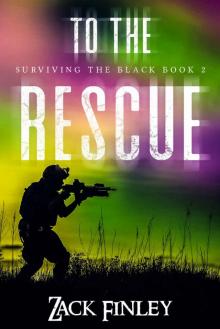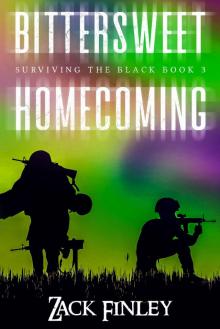- Home
- Zack Finley
To the Rescue; Surviving the Black--Book 2 of a Post-Apocalyptical Series Page 12
To the Rescue; Surviving the Black--Book 2 of a Post-Apocalyptical Series Read online
Page 12
That depended upon getting it to start. We snagged Joel down on one of his trips back from Oneida. He and two from Force Beta and the excavator operator went to the scrap yard. They went in force to check for threats and survey the business for possible salvage. I was told to stay at Justice.
While we waited for the excavator, the construction of the mini-flush toilet system was underway. I had encountered similar systems in Africa. They were comparable to pit toilets but with a composting twist. There was a cleverly counterweighted flap that formed a liquid-tight barrier between the pit and the user.
Toilet etiquette required the last user put about a quarter cup of water into the toilet to keep the smelly gases in check. Once someone completed their business, they used a side handle to tip the counterweight and shit dropped into the compost field below. The solids stayed in the upper chamber while all liquids drained through wire mesh covered by a Geotech fabric into a drain area below. Any accumulated liquid gathered in the bottom of the pit and drained to a soak-away pit filled with gravel some distance away.
Before putting the toilets in service, we needed to spread some rabbit mulch material onto the fabric, to jumpstart the composting process. When I introduced rabbits into the Valley food supply, I’d gone with a hutch design that incorporated some old techniques. Poop and urine from the hutches dropped into a compost bed where a host of earthworms transformed it into garden compost. Those tending the rabbits had to rake the compost bed if flies or odors became a problem and every year or so, we could harvest the compost for the garden and start again. For this application, I figured a few barrels of the immature compost, and worms, would do the trick.
Removing the black water from the Justice building’s drains would allow us to flush out the existing sewer lines in the building and convert them to grey water. We could then either collect the grey water for reuse, allow it to drain into local creeks, or put in a small septic field to dissipate any excess grey water.
It was a great design with potential for use in the Valley and of likely interest to other survivors. I was lucky the civil engineer in me had an interest in such things. The work would only take a few more days. They needed the concrete and mortar to set up before we could add the compost and put on the seats.
I certainly thought it was a better solution than five-gallon plastic buckets with toilet seats they were using now in Justice. The composting toilets we brought over required too much training and were abandoned within days.
Force Gamma was doing most of the construction, and they didn’t need me hovering, so I went inside to see if there was something I could actually help with. They sent me to relieve the radio operator for a few minutes. I suspected it was me they were trying to get a break from. The radio operator looked younger than Joe and just a bit older than Jennifer. He was one of Sally’s trainees and volunteered for the Justice assignment.
Joel notified Justice he was coming in with an excavator. It sounded like his escort was staying behind for some reason. I had to stop myself from jumping into the situation. I knew Joel was armed and quite dangerous. I’d been out of the loop for days. He knew the threat level a lot better than I did. I took a deep breath and immediately regretted it as my rib reminded me why I was on the sidelines.
When the radio operator returned, I updated him on the incoming excavator and went outside to wait.
If I thought the Humvees were loud, the excavator redefined the term. My hearing was slowly coming back, and the ringing in my ears was fading so I was more sensitive to these things.
The device towered over the area, reminding me of a primitive dinosaur. I was already thinking of other ways to use it for large construction projects in the future, now we knew it would start.
Joel wasn’t driving, he was in guard mode. The excavator would have to get next to the building before we could confirm it was tall enough. Seeing the behemoth, I wasn’t worried anymore about the weight of our plastic tank exceeding its lift capacity.
I liked it when a better plan comes together. My winch and pulley system would have worked, in theory. But, I knew this would work.
The excavator operator dropped Joel off in the parking lot. The operator then spent about 20 minutes putting the excavator through its paces before moving into position beside the building.
The excavator's arm was definitely high enough. Its bucket wasn’t wide enough for the tank to sit on, so we’d have to dangle it from the arm. The tank had lifting lugs on the top, so this was not a big challenge.
About an hour later the tank was exactly where we wanted it.
Scott and I were sent back to the Valley to let everyone else get back to work. We arrived in time for supper, and my mom joined us. This was very unusual, and I suspected it was some type of intervention.
My mom didn’t respond to my suspicion. I updated her on the progress at Justice and the acquisition of a huge excavator. I wasn’t sure what else it might be useful for, but building new catfish ponds still came to mind.
We finished supper and Scott excused himself. My mom didn’t budge.
“Are you ready to finally come help me?” my mom asked.
“What?”
“I was told to keep my mitts off you until the water and sewage situation was resolved at Justice,” she said. “Are you ready to do some real work?”
“What do you need,” I said. “My ribs are still too sore for me to do much.”
“I don’t care about that. I need help reallocating resources and changing plans now that we have Justice. I’ve got volunteers willing to go. I have others who would prefer to be there. I need to reboot and decide where we go from here,” she said. “I would never have wished you to be wounded, but I’m damn glad you are available.”
For the next week, I worked from dawn to after dark with my mom. She forced me to walk with her to and from breakfast and supper each day, or I wouldn’t have gotten any exercise.
I let Force Beta set their own priorities and protocols. Roger and Zeke were working well together, and I wanted to encourage that. Until I could put on my own jacket, I had no business poking my nose into what was happening in Oneida. All I saw were the summaries of recovered items arriving in my mom’s office.
I figured out why Dr. Jerrod left the decision about returning to full duty to me. Dr. Jerrod removed the stitches from my side on day 10. The wound site, especially on the back side was still puckered and sore, but nothing that would slow me down. My chest bruise was still a mix of purple and blue with only the edges turning green and yellow.
My busted rib was still giving me fits. I had to shuffle slowly to keep it from hurting. Forget about jogging. I nearly collapsed when I tried it. I could now lift my left arm without pain but lifting the right arm by even a few inches robbed me of any breath. I could at least dress without needing help although I was still wearing pull-on boots.
Dr. Jerrod said this was typical for the rib I broke. She thought it might take up to another month for me to return to active duty, but that was up to me and my pain tolerance. “With your injury, I expect you will gradually begin to feel better. I doubt you will be pain-free for at least another six to seven weeks. With your work ethic and pain tolerance, I suspect you will be back at PT in another 10 days or so. When you are back to warrior shape, put yourself back on active duty but avoid being at the point of the spear until you are pain-free. If you are going to get shot in the chest again, it would be better if your rib wasn’t weak.”
Two days after my discussion with Dr. Jerrod, Force Beta was sent to the Valley rest up and get some well-deserved R&R. One of the first things they did was break out one of the footballs my mom retrieved from Walmart for a pickup game.
Zeke called an all-hands meeting of Force Beta and made sure I knew I was expected to attend over supper the next day.
Before the meeting, Zeke took me aside. He reminded me that while I wasn’t yet fit for duty, I was still the commander. “I know, Zeke,” I said, “I just needed a break, and I knew
I had good people looking out for the team.”
After everyone got their meals, Ben announced he wanted to present me with a token of their appreciation.
I was ordered to stand at attention while he approached. Everyone broke up into guffaws when he handed me my spalled chest plate.
My laughter was cut short when my ribs reminded me that laughing was still on the list of bad ideas.
Tom told everyone we all were lucky that I insisted on Level IV vests with ESAPI plates. He wasn’t sure at that range if a SAPI plate would have stopped the bullet.
Zeke then presented me with my official Mecklin Defender armband and helmet patch.
“I know Roger only picked purple because Walmart couldn’t sell it, but oddly I think it helps,” Buzzer said. “People are comfortable with the name Mecklin Defender. The name tells them we’re local, defender is not as aggressive as militia or army, and the purple makes it easy to identify us.”
“I’m just glad Walmart didn’t have two cases of pink paint,” Joel said.
“What’s wrong with pink?” someone asked.
“It clashes with my eyes,” Joel said, causing another round of laughter.
“Show us your bruise,” Matt said to me. “I want everyone to see why they should avoid getting shot in the chest.” This caused a round of hoots and even a few catcalls and a slow rendition of the “Stripper.”
Giving in, I unbuttoned my shirt, ignoring the pain from my right side. What they saw must have surprised them because they shut up.
Buzzer restored the levity, “Boss you don’t need any purple armband, you could just take your shirt off.”
That warranted a few chuckles, allowing Zeke to begin the full briefing, while I rebuttoned my shirt.
We now had solid intel on much of the county. Recon teams visited much of Mecklin County to deliver leaflets. As teams reported in, they updated the satellite map of Mecklin County. It now showed the buildings that were heated, burned down, or looted. Other markings indicated potential salvage locations. Over the past week, I helped my mom organize the information, so if we identified a need, we could quickly get a list of places to search.
A more difficult challenge was finding out more about the neighbors who remained. Ideally, we’d have a threat assessment for each group. Of equal long-term importance was a way to identify any people or groups with strategic skills. We still hadn’t found a pilot or a veterinarian.
As the Oneida salvage operation wound down, Roger and my dad began visiting people in the Huntsville area that they knew. The intent was to start building alliances and to reinforce the “don’t shoot” directive. We were hoping that offering medical help would win over the skeptics.
Matt and Buzzer visited their old comrades near the middle school who agreed to tune back in on the radio. They helped spread the word that we were the good guys.
Zeke reduced our regular patrol size down to two people. If a third person was needed, we tried to bring someone along from Gamma. I suspected by spring most routine fire teams would be comprised of one Ranger and one Gamma
The National Guard Armory by the Mecklin County Airport was abandoned. All the military vehicles were gone, and the building was cold. Major Thomas left nothing salvageable inside the armory building. The aviation gasoline tanks were still reasonably full, and there were still some aircraft parked in hangers and on the tarmac. I suspected that Major Thomas got reinforcements from somewhere. I was just glad we acquired five of his Humvees before he left. It also told me that not all through highways were impassible.
One team relocating an exile to the east made it all the way to the freeway. So many crashed and abandoned vehicles clogged I-75 north of Jacksboro that no car could get through going north or south of that bottleneck. The team wasn’t even sure one of our ninjas could get by in some places. The trailer Jerry Hill placed across TN-397 early after the crash served its purpose. Many of those who tried to come that way abandoned their vehicles on the freeway side of the trailer. Whether they ran out of gas or just had no way to turn around wasn’t clear. The resulting line of abandoned cars meant that even if we removed the trailer that way into Mecklin County was blocked.
People now used the freeway as a walking path. Some groups trudged north and some south. Most carried packs, a few pushed shopping carts, and others dragged travois. Some appeared to be family groups, while others were groups of young men. In the time our team watched, every group had at least two long guns. Some carried at the ready, and some slung over a shoulder.
I-75 connected Knoxville, Chattanooga and eventually Atlanta, Georgia to our south with Lexington, Kentucky and eventually to Cincinnati, Ohio to our north. Before the crash, it was mainly a scenic highway. While Knoxville and Chattanooga were the third and fourth largest cities in Tennessee before the crash, they were relatively small with populations of less than 200,000 people.
I liked our chances of avoiding an influx of refugees from big cities. There was a lot of distance and thousands of small communities between Huntsville and any sizable city. I expected refugees from the larger cities to divert into the small towns closer to the cities or for them to hike along freeways and pass us by. Tennessee was blessed because its climate and soils would make it easier for people to survive off the land.
Many areas of the country weren’t so fortunate. Many trying to eke out a living in this new reality, would find little rainfall, extreme winters, or extreme summers where they lived. Jules in California and his brother Andy in Arizona came immediately to mind.
The proximity of vast metropolitan areas like New York, Los Angeles, Chicago, Dallas or any other place millions of people congregated would make the situation so much worse. I believed these areas would approach the doomsday 90 percent die off some predicted before the crash.
What surprised me was how fast so many Mecklin County residents abandoned their property and went somewhere else.
◆◆◆
Chapter 7
As the bruise on my chest shifted slowly from technicolor dark blues and purples to greens and yellows, I found I could move my arm incrementally more without triggering excruciating pain. By the third week in January I was finally taking part in PT each morning.
I still spent much of the day helping with overall logistics, since I wasn’t yet up to splitting wood, although I intended to give even that a try by the end of January. I was back to bringing a rifle and wearing full armor. Since we carried a light load except on patrol, it wasn’t as restrictive as it might be.
Someone cleaned the blood out my old plate carrier for me, and I refused to trade it in for a new one. I wasn’t sure whether it was despite the small hole in the chest or because of it. Zeke fitted me with a thicker pad to go between my chest and the new ceramic chest plate, just in case lightning struck twice.
The Valley greenhouses were already starting plants for both the Valley and Justice. We’d had a few snow days and a couple of ice storms this month. Not having any warning about adverse weather was going to take some adjustments.
We were still more than three months away from the last frost here on the Cumberland Plateau. My mom intended to extend the growing season at both ends by using row covers and portable plastic covered hoop greenhouses.
Many cold season plants did better if planted directly in the soil. These wouldn’t go in until early March, even though frosts could be expected locally until mid-May. I suspected spring and fall the Valley and Justice security patrols would add thermometer watching to their nightly duties.
Granny, Joe, Ellie, and Billy were still staying with us at night. Steve’s three kids were spending more and more days at FOB Justice. I suspected they’d move to Justice sometime in the spring. I was surprised to realize that I’d miss them when they left.
The seven Force Beta troops staying at my house were offered rooms upstairs, but they turned down the offer. This allowed three families to move out of the steel barracks into cozier housing upstairs.
The upstairs res
idents came and went using the outside stairs exclusively, so we never saw them downstairs. We could hear them from time to time over our heads, but that was about it. They were pleasant enough when we ran into them on our way to-or-from the food hut. Granny learned they were so grateful for the better housing, they didn’t want to give us any reason to evict them.
The relationship between the Valley and the rest of Huntsville was improving each day. We increased the frequency of CB check-ins with the neighbors due to high demand. To encourage people to tune in, we broadcast at least one survival tip every session. After a few weeks, participation lagged again. When we learned this was due to dead batteries, Steve came up with a win-win solution. Steve offered a mini-solar CB power supply for those agreeing to alert us to vehicular traffic or strangers in the area. Nearly everyone with access to a CB signed up.
Justice’s new water tank went into service within hours of it being placed on the roof. The small solar array at the pump provided enough power to fill the tank during the day.

 To the Rescue; Surviving the Black--Book 2 of a Post-Apocalyptical Series
To the Rescue; Surviving the Black--Book 2 of a Post-Apocalyptical Series Dire Prophecy
Dire Prophecy Duchy Unleashed
Duchy Unleashed Mad Toffad's Keep
Mad Toffad's Keep Breckinridge Valley: Surviving the Black--Book 1 of a Post-Apocalyptical series
Breckinridge Valley: Surviving the Black--Book 1 of a Post-Apocalyptical series Bittersweet Homecoming; Surviving the Black--Book 3 of a Post-Apocalyptical Series
Bittersweet Homecoming; Surviving the Black--Book 3 of a Post-Apocalyptical Series